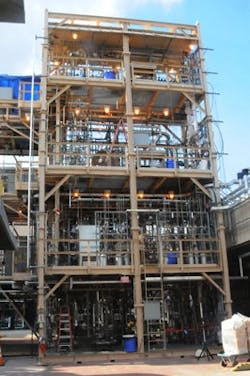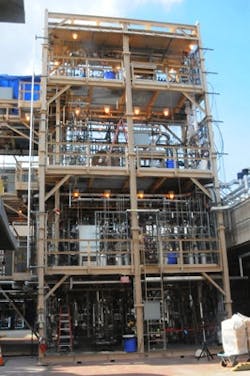Shell Showcases Emerging Technologies
Shell Global Solutions, Houston, recently offered a peek at a new route for producing a polycarbonate feedstock and the next generation of its OMEGA process for making mono-ethylene glycol (MEG). CP got details during a tour of Shell's Westhollow Technology Center in mid-October. The vast majority of polycarbonate production relies on phosgene chemistry, notes Garo Vaporiciyan, a venture manager at Westhollow. The phosgene-based process is relatively energy intensive, involves dilute polymer solutions in chlorinated solvents and requires salt removal, he explains. So, there's been a trend to replace toxic phosgene with diphenyl carbonate (DPC). This avoids a safety risk in making the polymer and obviates solvents and washing salt out of the polymer. In addition, co-product phenol can be used to make DPC or bisphenolacetone. While this approach eliminates phosgene from the polymer step, several companies use phosgene to make DPC. Non-phosgene-based DPC synthesis technology exists but such routes are cumbersome and energy intensive, contends Vaporiciyan, and so investment in phosgene-based DPC production continues. Shell is developing a process for DPC that he terms a step change improvement in chemistry. In the route, carbon dioxide, phenol and propylene oxide react to form propylene glycol and DPC. Ethylene oxide can replace propylene to give ethylene gyclol instead of propylene glycol.
OMEGA Pilot Plant
Figure 1. Unit at Westhollow Technology Center in Houston will start up in early 2010 and focus on process improvements.
Source: Shell Global Solutions.

